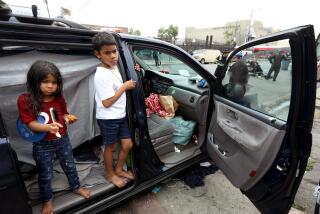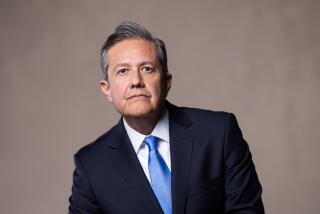Pico-Union : Leadership Program Grads Share Ideas
The 12 graduates of the Pico-Union Neighborhood Leadership Program want neighborhood youths to have the opportunities and resources to become effective leaders and productive citizens.
And to achieve those goals, the program participants--all of whom live or work in Pico-Union, Westlake or Koreatown--will apply the lessons they learned in the 14-week program.
Coro Southern California, a nonprofit educational foundation, polishes the skills of people already recognized for their leadership abilities and dedication to improving their communities. In addition to completing Coro training exercises, the participants interviewed public officials, police officers, church leaders, teachers, students and parents, collected demographic data on Pico-Union and worked on group projects.
“Most of us knew one another before but we’d never worked together as a team,” said Marino Minino, a health educator with Core Latino Project. “One thing we learned was that whatever it is, it is not.”
Minino explained that with the complexities of issues in Pico-Union and the diversity of the residents, every problem has several layers. Individuals’ perceptions vary and simple answers don’t apply. “Differences exist between everybody,” he said. “We just have to know how to work it out.”
Roberta Davis, another participant and director of programs at the Alcoholism Center for Women, agreed that group interaction was the program’s most valuable element. Looking at a problem from the perspectives of all the group’s members helped her remember “not to jump to conclusions and to look at all sides.”
The culmination of the group’s efforts was “Youth in Crisis: The Effects of Crime on Education in Pico-Union,” a report citing census data that show the area’s levels of unemployment, poverty and overcrowding exceed city averages. Those conditions especially hurt local youths, the group said.
“As more educational resources and recreational programs are being cut countywide, communities that already have limited resources are suffering and we are presently feeling its effects,” the report states. “In Pico-Union, there is a correlation between the lack of adequate school resources and the violence it breeds in a community that is socially, politically and financially in need.”
Among its recommendations, the group called for increased parental participation in school activities, enhanced community-based policing around schools, English and literacy classes for parents, more recreation centers, job training, greater political participation and additional funding for social services and educational programs.
The other graduates and their organizations are: Juan Carlos Cristales (El Rescate), Juan Flores (Centro Santo Tomas de Ayuda al Necesitado), Mariana Francisco (Clinica Monsignor Oscar Romero), Thelma Garcia (Hoover-Berendo Adult Education Centers), Rafael Gonzalez (field deputy, City Councilman Mike Hernandez), Sophia Park (Korean Youth and Community Center), Sushma Raman (Center for Human Rights and Constitutional Law), Landy Rosales, (Pio Pico Elementary School parents group), Gloria Soto (Angelica Lutheran Church) and Noe Mendez-Vides (Clinica Monsignor Oscar Romero).
Information: (213) 623-1234.
More to Read
Sign up for Essential California
The most important California stories and recommendations in your inbox every morning.
You may occasionally receive promotional content from the Los Angeles Times.










